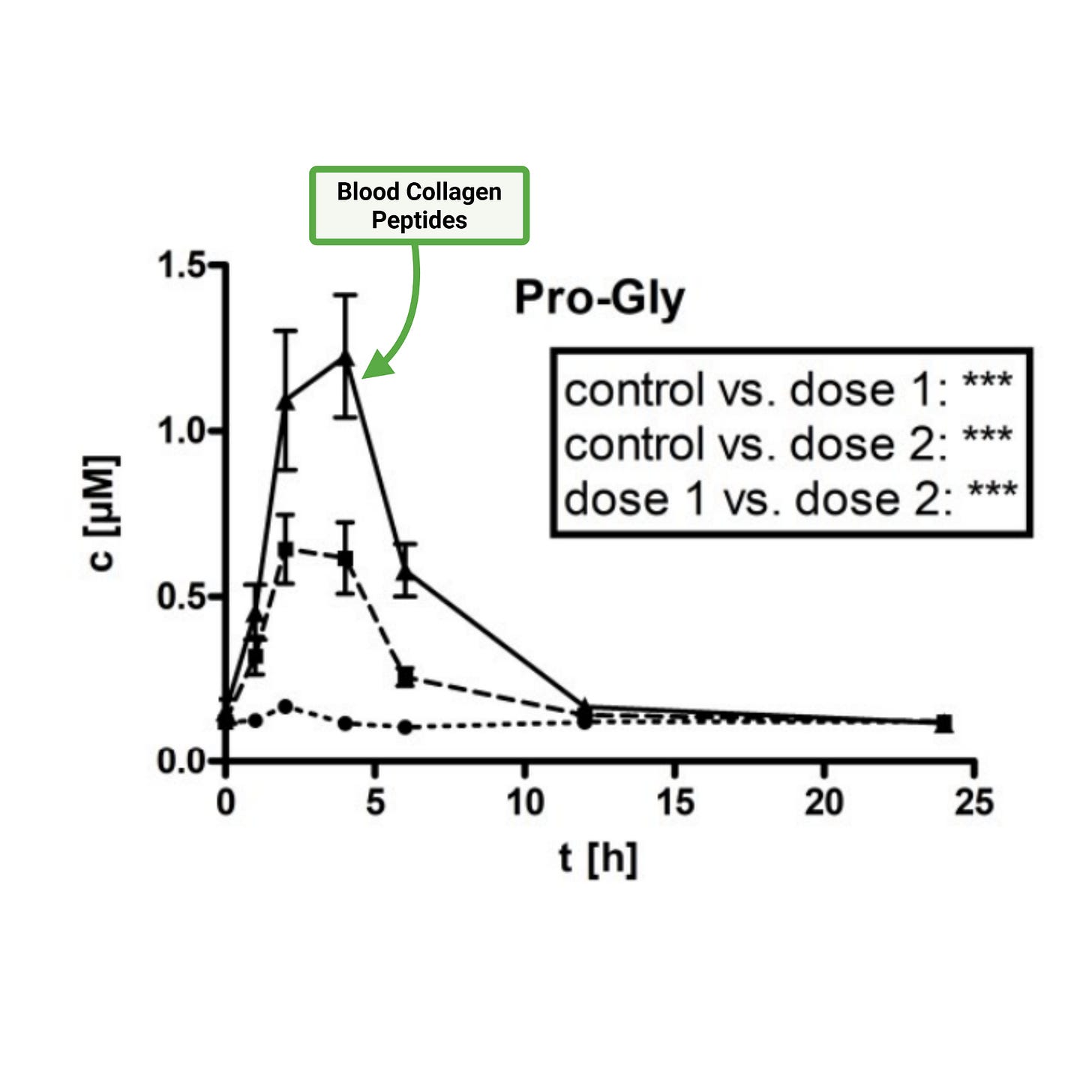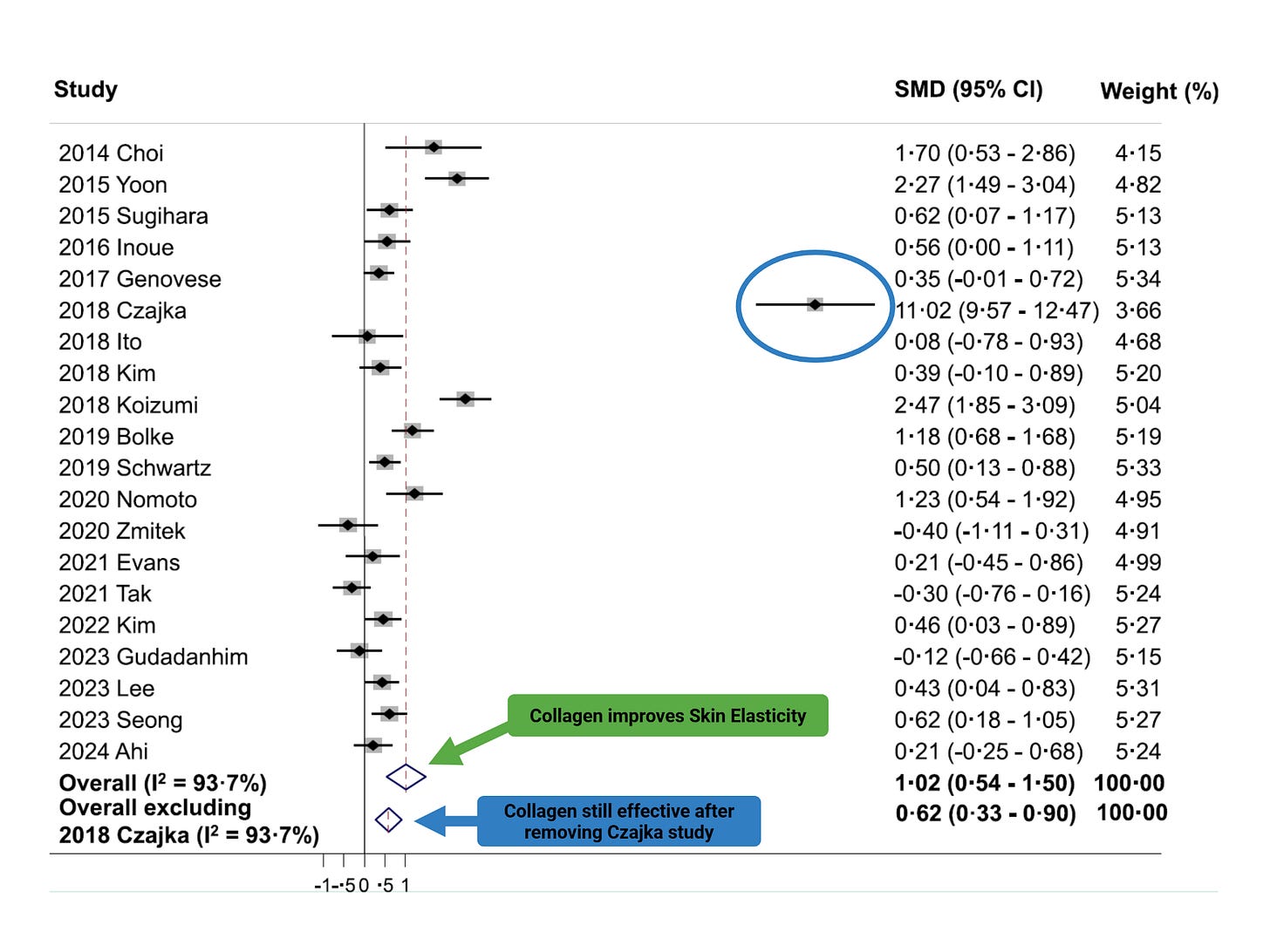Collagen Supplements are a Scam? New Analysis
Main Points
Collagen peptides are absorbable as small peptides and may signal skin cells, which provides a plausible mechanism for benefit. Human evidence is mixed but leans modestly positive: several independent RCTs show improvements in elasticity/hydration/wrinkles, while others show no effect; pooled results weaken when outliers are removed and when you isolate non-industry-funded trials. The biggest gap is a lack of protein-comparator studies to prove a collagen-specific effect. If you try collagen, keep expectations realistic, prioritize skincare fundamentals and overall protein intake, and evaluate your own response over 8–12 weeks.
Collagen peptide dosing
More in-depth analysis of collagen’s effectiveness, physiologically
All of that is included in the complete analysis, along with access to a private podcast, live sessions with me, a library of articles and videos, and much more as a Physionic Insider:
“Collagen is a scam” makes great clickbait—but the actual research is more nuanced. Collagen peptides are broken down during digestion into amino acids and tiny di- and tripeptides that can enter the bloodstream. In lab models, those peptides can signal skin cells to make more structural proteins. And in human trials, results range from modest benefits to no effect—often depending on study quality, funding source, and which outcomes are measured.
What Collagen Peptides Are (and Why They Might Matter)
Unlike whole collagen, hydrolyzed collagen (collagen peptides) contains short fragments of collagen that are easier to absorb. After collagen peptide consumption, blood tests do show collagen-like di- and tripeptides circulating—supporting the idea that the body can take up small peptide fragments, not just single amino acids [B]. In cell experiments [C], adding collagen peptides can increase the expression of skin matrix proteins and related genes, suggesting a signaling effect in addition to simply supplying building blocks.
The New Meta-analysis—and Why Opinions Differ
A recent meta-analysis [A] concluded, initially, that collagen improves several measures of skin aging (elasticity, hydration, wrinkles). Critics point out that the overall signal shrinks when outlier studies are removed and when analyzing non-industry-funded trials separately. Supporters counter that most independent randomized trials still trend pro-collagen on at least one skin outcome, and that effect sizes are modest—not miraculous, so you need enough data to detect them. The truth likely sits between: small but potentially real improvements that are sensitive to how you slice the evidence.
Collagen peptide dosing
More in-depth analysis of collagen’s effectiveness, physiologically
All of that is included in the complete analysis, along with access to a private podcast, live sessions with me, a library of articles and videos, and much more as a Physionic Insider :
Independent Trials: What They Tend to Show
When you scan the non-industry studies grouped in that review, the majority report better elasticity, hydration, or wrinkle scores with oral collagen peptides versus placebo over a few weeks to a few months; a minority show no benefit. Differences in dose, peptide composition, measurement tools, and climate/season (which affect skin hydration) all contribute to the mixed signals. Net-net: you can find positive independent RCTs and null ones—so expectations should be modest.
The Biggest Open Question
Almost all skin trials compare collagen peptides to placebo, not to an equal dose of a high-quality complete protein or to glycine/proline-rich proteins. If the real win is “more total protein” rather than “collagen-specific signaling,” a protein comparator is the only way to tell. Until those head-to-head studies exist, we should avoid overclaiming “unique” effects.
Practical Takeaways (Public-Friendly)
Expect subtle shifts, not facelifts. When benefits appear, they’re usually small to moderate changes in elasticity, hydration, or wrinkle depth over 8–12 weeks.
Quality matters. Look for products that disclose peptide standardization and are third-party tested.
Keep the basics first. Sun protection, retinoids (if appropriate), adequate dietary protein, sleep, and smoking cessation have larger, better-proven effects on skin health than any supplement.
Consider a trial period. If you want to try collagen, track one or two objective measures (e.g., corneometer readings, standardized photos, or clinician-graded scales) for 8–12 weeks and stop if you don’t see value.
Main Points
Collagen peptides are absorbable as small peptides and may signal skin cells, which provides a plausible mechanism for benefit. Human evidence is mixed but leans modestly positive: several independent RCTs show improvements in elasticity/hydration/wrinkles, while others show no effect; pooled results weaken when outliers are removed and when you isolate non-industry-funded trials. The biggest gap is a lack of protein-comparator studies to prove a collagen-specific effect. If you try collagen, keep expectations realistic, prioritize skincare fundamentals and overall protein intake, and evaluate your own response over 8–12 weeks.
Collagen peptide dosing
More in-depth analysis of collagen’s effectiveness, physiologically
All of that is included in the complete analysis, along with access to a private podcast, live sessions with me, a library of articles and videos, and much more as a Physionic Insider:
Dr. Nicolas Verhoeven, PhD / Physionic
References
[A] Myung SK, Park Y. Effects of Collagen Supplements on Skin Aging: A Systematic Review and Meta-Analysis of Randomized Controlled Trials. Am J Med. 2025;138(9):1264-1277. doi:10.1016/j.amjmed.2025.04.034
[B] Rohm F, Skurk T, Daniel H, Spanier B. Appearance of Di- and Tripeptides in Human Plasma after a Protein Meal Does Not Correlate with PEPT1 Substrate Selectivity. Mol Nutr Food Res. 2019;63(5):e1801094. doi:10.1002/mnfr.201801094
[C] Dierckx S, Patrizi M, Merino M, González S, Mullor JL, Nergiz-Unal R. Collagen peptides affect collagen synthesis and the expression of collagen, elastin, and versican genes in cultured human dermal fibroblasts. Front Med (Lausanne). 2024;11:1397517. Published 2024 May 1. doi:10.3389/fmed.2024.1397517



